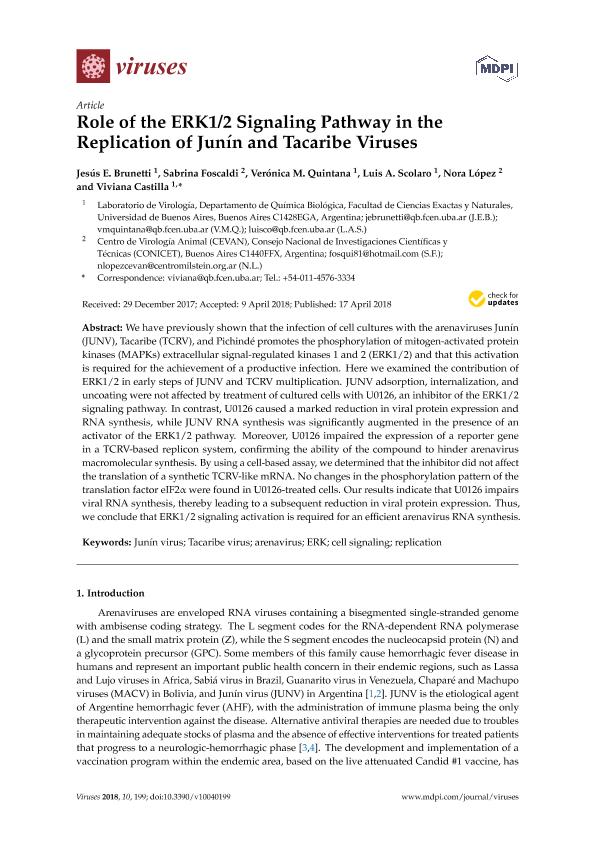Artículo
Role of the ERK1/2 signaling pathway in the replication of junín and tacaribe viruses
Brunetti, Jesús Emanuel ; Foscaldi, Sabrina Andrea
; Foscaldi, Sabrina Andrea ; Quintana, Verónica Mara
; Quintana, Verónica Mara ; Scolaro, Luis Alberto
; Scolaro, Luis Alberto ; Lopez, Nora Mabel
; Lopez, Nora Mabel ; Castilla, Viviana
; Castilla, Viviana
 ; Foscaldi, Sabrina Andrea
; Foscaldi, Sabrina Andrea ; Quintana, Verónica Mara
; Quintana, Verónica Mara ; Scolaro, Luis Alberto
; Scolaro, Luis Alberto ; Lopez, Nora Mabel
; Lopez, Nora Mabel ; Castilla, Viviana
; Castilla, Viviana
Fecha de publicación:
04/2018
Editorial:
MDPI
Revista:
Viruses
ISSN:
1999-4915
Idioma:
Inglés
Tipo de recurso:
Artículo publicado
Clasificación temática:
Resumen
We have previously shown that the infection of cell cultures with the arenaviruses Junín (JUNV), Tacaribe (TCRV), and Pichindé promotes the phosphorylation of mitogen-activated protein kinases (MAPKs) extracellular signal-regulated kinases 1 and 2 (ERK1/2) and that this activation is required for the achievement of a productive infection. Here we examined the contribution of ERK1/2 in early steps of JUNV and TCRV multiplication. JUNV adsorption, internalization, and uncoating were not affected by treatment of cultured cells with U0126, an inhibitor of the ERK1/2 signaling pathway. In contrast, U0126 caused a marked reduction in viral protein expression and RNA synthesis, while JUNV RNA synthesis was significantly augmented in the presence of an activator of the ERK1/2 pathway. Moreover, U0126 impaired the expression of a reporter gene in a TCRV-based replicon system, confirming the ability of the compound to hinder arenavirus macromolecular synthesis. By using a cell-based assay, we determined that the inhibitor did not affect the translation of a synthetic TCRV-like mRNA. No changes in the phosphorylation pattern of the translation factor eIF2α were found in U0126-treated cells. Our results indicate that U0126 impairs viral RNA synthesis, thereby leading to a subsequent reduction in viral protein expression. Thus, we conclude that ERK1/2 signaling activation is required for an efficient arenavirus RNA synthesis.
Palabras clave:
ARENAVIRUS
,
CELL SIGNALING
,
ERK
,
JUNÍN VIRUS
,
REPLICATION
,
TACARIBE VIRUS
Archivos asociados
Licencia
Identificadores
Colecciones
Articulos (CEVHAN)
Articulos de CENTRO DE VIROLOGIA HUMANA Y ANIMAL
Articulos de CENTRO DE VIROLOGIA HUMANA Y ANIMAL
Articulos(OCA CIUDAD UNIVERSITARIA)
Articulos de OFICINA DE COORDINACION ADMINISTRATIVA CIUDAD UNIVERSITARIA
Articulos de OFICINA DE COORDINACION ADMINISTRATIVA CIUDAD UNIVERSITARIA
Citación
Brunetti, Jesús Emanuel; Foscaldi, Sabrina Andrea; Quintana, Verónica Mara; Scolaro, Luis Alberto; Lopez, Nora Mabel; et al.; Role of the ERK1/2 signaling pathway in the replication of junín and tacaribe viruses; MDPI; Viruses; 10; 4; 4-2018
Compartir
Altmétricas



